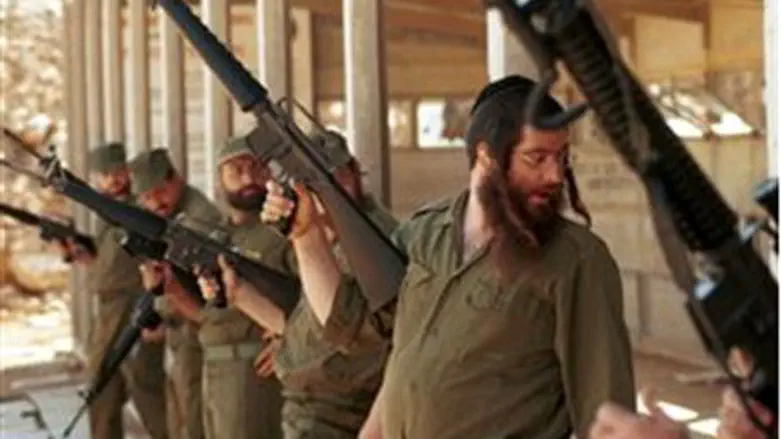
Members of Knesset in the Equality in Burden of Service Committee, a committee tasked with researching the issue of hareidi-religious IDF recruitment, met with various IDF soldiers and commanders Thursday to hear more about the lives of the young hareidi men who currently serve in the army by choice.
Currently, whilst other Jewish Israeli men are obligated to enlist into the army, those men studying in hareidi yeshivot (Torah academies) receive a special exemption for being in "full-time Torah learning." Unlike the Religious Zionist "hesder yeshiva" and "mechina" institutions - which integrate army service and intensive Torah learning - hareidi yeshivas advocate Torah as a "full-time occupation."
The fairness and sustainability of that arrangement has been the subject of fierce debate in Israel, and the current Knesset session looks likely to pass a bill requiring the majority of hareidi men - bar a select few "elite" full-time scholars - to engage in some kind of national service.
Some hareidim already serve in the army voluntarily, including those service in the Netzach Yehuda infantry battalion (also known as Nachal Hareidi).
Commanders from Netzach Yehuda told visiting MKs that the hareidi soldiers under their command are highly motivated.
“This is the battalion that had the most ‘encounters’ last year of any in the IDF,” the battalion commander told them, referring to incidents in which soldiers were called on to fight terrorists.
“These soldiers are the best example of integrating military service with a hareidi lifestyle,” he said. “Netzach Yehuda makes history every day.”
MKs learned that soldiers serving in Netzach Yehuda are also active in recruiting. Several soldiers in the battalion visit hareidi neighborhoods in uniform and discuss IDF service with local youths.
The MKs also visited the Air Force base in Tel Nof, where there are hareidi soldiers working as technicians. They heard that the base could integrate four times as many hareidi soldiers as it currently has without creating a problem for either the hareidi recruits, who would like to maintain their standards of religious observance, or for secular soldiers, who do not want to change their own way of life.
Commanders at the base told the MKs that hareidi soldiers’ service has a long-lasting impact. Many leave the army with advanced technical skills that assist them in establishing a career, they explained.
Hareidi soldiers in the Air Force reported having problems at home thanks to their IDF service. In recent months, as the subject of hareidi IDF service became a hotly debated topic, they began to be treated badly when walking around their home neighborhoods in IDF uniform, they said.
Many of the soldiers said they remove their uniforms and put on civilian clothing before entering the neighborhoods they live in.
Following the tour, committee head MK Ayelet Shaked (Bayit Yehudi) said, “During our tour we met wonderful hareidi men from various communities who didn’t know English or math before they enlisted, and now work in computer programming. The army does amazing work to integrate hareidi men, and we should not get in the way.”
MK Dov Lipman (Yesh Atid) said the tour proved that enlisting in the IDF does not have a negative effect on hareidi men’s religious observance.